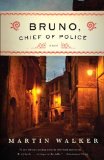Summary | Excerpt | Reviews | Beyond the Book | Readalikes | Genres & Themes | Author Bio

1
On a bright May morning, so early that the last of the mist was still lingering low over a bend in the Vézère River, a white van drew to a halt on the ridge that overlooked the small French town. A man climbed out, strode to the edge of the road and stretched mightily as he admired the familiar view of St. Denis. The town emerged from the lush green of the trees and meadows like a tumbled heap of treasure; the golden stone of the buildings, the ruby red tiles of the rooftops and the silver curve of the river running through it. The houses clustered down the slope and around the main square of the Hôtel de Ville where the council chamber, its Mairie, and the office of the town’s own policeman perched above the thick stone columns that framed the covered market. The grime of three centuries only lately scrubbed away, its honey-colored stone glowed richly in the morning sun.
On the far side of the square stood the venerable church, its thick walls and squat tower a reminder of the ages past when churches, too, were part of the town’s defenses, guarding the river crossing and the approach to the great stone bridge. A great “N” carved into the rock above the central of the three arches asserted that the bridge had been rebuilt on the orders of Napoleon himself. This did not greatly impress the town’s inhabitants, who knew that the upstart emperor had but restored a bridge their ancestors had first built five centuries earlier. And now it had been established that the first bridge over their river dated from Roman times. Across the river stretched the new part of town, the Crédit Agricole bank and its parking lot, the supermarket and the rugby stadium discreetly shaded by tall oaks and thick belts of walnut trees.
The man enjoying this familiar sight was evidently fit enough to be dapper and brisk in his movements, but as he relaxed he was sufficiently concerned about his love of food to tap his waist, gingerly probing for any sign of plumpness, always a threat in this springtime period between his last game of the rugby season and the start of serious hunting. He wore a uniform of sorts, a neatly ironed blue shirt with epaulettes but no tie, navy blue trousers and black boots. His thick, dark hair was crisply cut, his warm brown eyes had a twinkle, and his generous mouth seemed ready to break into a smile. On a badge on his chest, and on the side of his van, were the words POLICE MUNICIPALE. A peaked cap lay on the passenger seat.
In the back of the van were a crowbar, a tangle of battery cables, one basket containing newly laid eggs from his own hens, and another with his garden’s first spring peas. Two tennis rackets, a pair of rugby boots, sneakers, and a large bag with various kinds of sports attire and a spare line from a fishing rod added to the jumble. Tucked neatly to one side were a first-aid kit, a small tool chest, a blanket, and a picnic hamper with plates and glasses, salt and pepper, a head of garlic and a Laguiole pocketknife with a horn handle and a corkscrew. Tucked under the front seat was a bottle of not-quite-legal eau-de-vie from a friendly farmer. He would use this to make his private stock of vin de noix when the green walnuts were ready on the feast of St. Catherine. Benoît Courrèges, chief of police for the small commune of St. Denis and its 2,900 souls, and universally known as Bruno, was always very well prepared.
He chose not to wear the heavy belt that weighs down almost every policeman in France with its attachments of holster and pistol, handcuffs and flashlight, keys and notebook. There was a pair of ancient handcuffs somewhere in his van, but Bruno would have to conduct a search to find them. He had a flashlight but it could use a new set of batteries. The van’s glove compartment held a notebook and some pens, but the notebook was full of various recipes, the minutes of the last tennis-club meeting and a list of the names and phone numbers of the minimes, the young boys who had signed up for his tennis lessons.
Excerpted from Bruno, Chief of Police by Martin Walker Copyright © 2009 by Martin Walker. Excerpted by permission of Knopf, a division of Random House, Inc. All rights reserved. No part of this excerpt may be reproduced or reprinted without permission in writing from the publisher.
Your guide toexceptional books
BookBrowse seeks out and recommends the best in contemporary fiction and nonfiction—books that not only engage and entertain but also deepen our understanding of ourselves and the world around us.